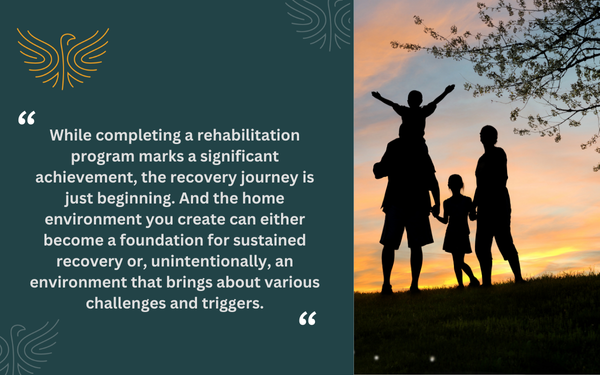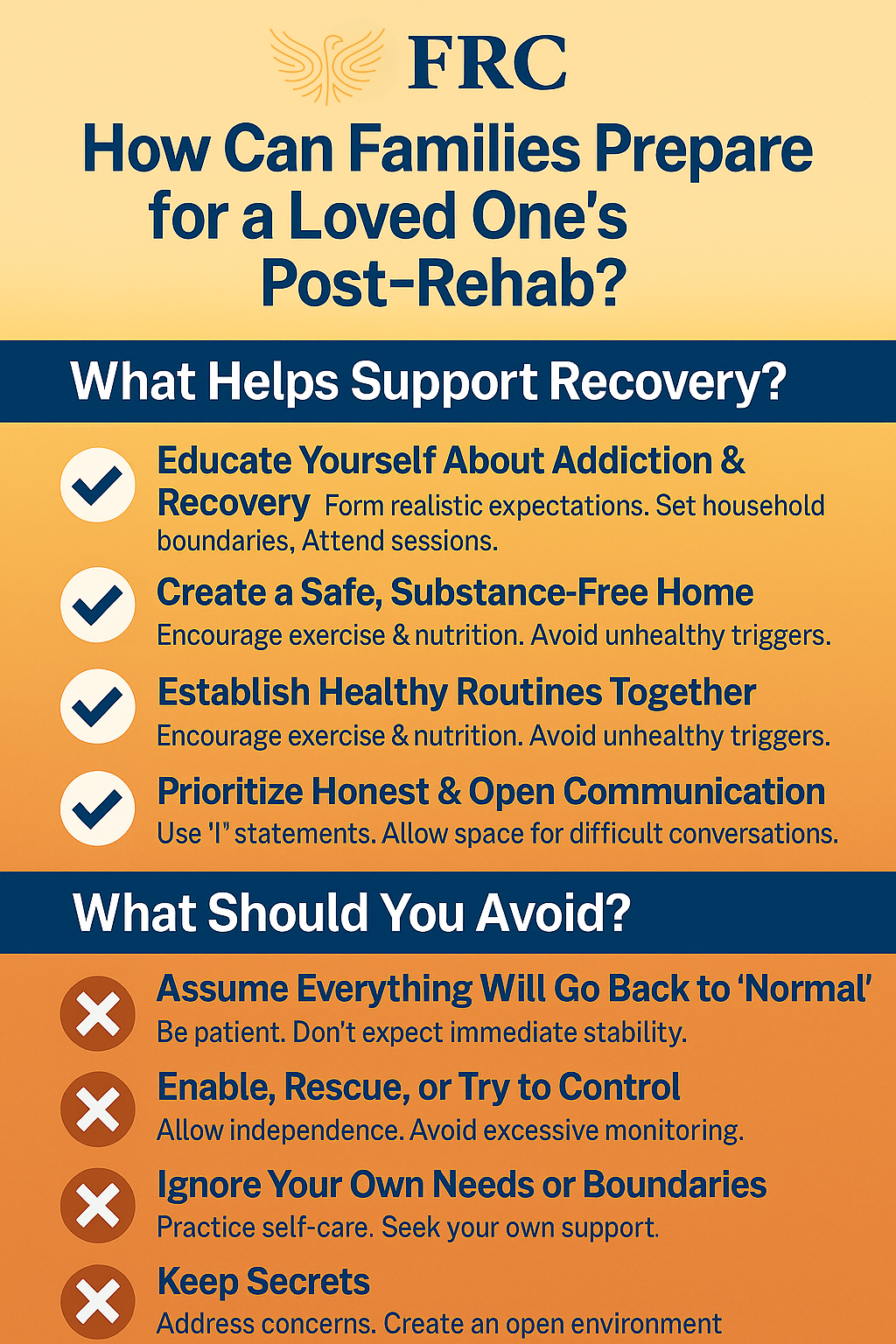The day has arrived: Your loved one is coming home from rehab! Yet, it’s common for this milestone to bring a mix of emotions, including hope, joy, nervousness, and uncertainty. While completing a rehabilitation program marks a significant achievement, the recovery journey is just beginning. And the home environment you create can either become a foundation for sustained recovery or, unintentionally, an environment that brings about various challenges and triggers.
So, what should you prepare? How can you ensure this transition is as seamless as possible for your loved one and that you create an environment that both supports your loved one and respects your boundaries? Below, we provide the dos and don’ts that can help guide you through this transitional period.

_______________________________________________________
What Helps Support Recovery?
Here are the top things you should do before and when your loved one arrives home.
Do: Educate Yourself About Addiction & Recovery
Knowledge is power. The more you understand addiction, the more you can support someone through it.
In other words, learning about how substance use affects the brain and behavior can go a long way—it helps you develop empathy and set realistic expectations for the recovery journey.
More specifically, learning about relapse prevention is imperative during this transitional time. It’s important to recognize early warning signs—like withdrawal from others, heightened stress, or shifts in daily routines—that might signal your loved one is having a tough time. If a relapse does happen, try not to see it as a failure. In fact, it’s quite common; research shows that 40-60% of people in recovery relapse at least once.
Additionally, you don’t have to navigate this alone. Many treatment centers offer family education sessions and support groups like Al-Anon or Nar-Anon, which help you connect with others who understand what you're going through.
Do: Create a Safe, Substance-Free Home
Before your loved one returns, remove all alcohol and recreational drugs from the home. On top of this, carefully secure necessary prescription medications.
Beyond physical substances, consider environmental triggers. This might mean avoiding certain movies, music, or social media that glorify substance use. It could also mean temporarily changing routines that were previously associated with using, such as certain driving routes or social gatherings.
It’s also essential to establish clear boundaries about what is and isn’t welcome in your home. Have a family meeting to discuss these changes, emphasizing that they come from a place of support rather than punishment or distrust.
Do: Establish Healthy Routines Together
Regular meal times, consistent sleep patterns, and daily physical activity create stability that helps manage stress and emotional regulation. In turn, this can help prevent the risk of relapse.
So, what’s the best way to do this? You may want to consider inviting your loved one to participate in establishing new family routines, which gives them agency in their recovery. For instance, low-pressure activities like cooking dinner together, evening walks, or weekend breakfast traditions provide connection without overwhelming social demands. These routines can also create natural opportunities for rebuilding relationships.
Do: Encourage Ongoing Treatment
Recovery is a lifelong journey requiring ongoing support. Encourage your loved one to participate in aftercare programs, therapy appointments, recovery meetings, or other recommended follow-up care.
Celebrate recovery milestones, whether that’s 30 days, six months, or other achievements. These acknowledgments reinforce progress and build confidence.
Do: Prioritize Honest & Open Communication
Practice using “I” statements that express your feelings without accusation. Some examples include: “I feel worried when you come home later than expected without letting me know,” instead of “You're being irresponsible again.”
It’s also important to create space for difficult conversations about past hurts, current challenges, and future concerns. These discussions may be uncomfortable, but they are essential for rebuilding trust. When tensions rise, consider implementing a “time-out” system where anyone can pause the conversation until emotions settle.
Another important thing to note here: Actively listen! Your loved one’s perspective on their recovery journey is valuable, even when it differs from your expectations. Sometimes, simply being heard without judgment or advice is the greatest support you can offer.
_______________________________________________________
What Should You Avoid?
While the above determines what you can do to support your loved one, here are a few things you should avoid!
Don’t: Assume Everything Will Go Back to “Normal”
Avoid pressuring your loved one to immediately resume previous responsibilities or act like “their old self.” Early recovery requires significant emotional and physical energy. Allowing space for this adjustment period demonstrates understanding of the recovery process.
Additionally, before they arrive home, prepare for emotional ups and downs. The brain takes time to heal, and mood swings, irritability, or fatigue are common in early recovery.
Don’t: Enable, Rescue, or Try to Control
Supporting recovery means allowing natural consequences while providing emotional support. If your loved one makes choices that lead to difficulties, resist the urge to shield them from the outcomes. Learning from their mistakes is an essential part of recovery.
While concern is natural, avoid excessive monitoring or interrogation. Ultimately, constantly checking their whereabouts, searching their belongings, or demanding explanations fosters resentment. Remember, trust builds gradually through consistent actions over time!
Don’t: Ignore Your Own Needs or Boundaries
Addiction affects the whole family, often creating patterns like codependency, burnout, or constant worry. These don’t just go away when your loved one starts recovery. Therapy, support groups, and self-care are important for your healing, too.
It’s also essential to set clear boundaries to protect your well-being. This might mean limiting tough conversations, carving out personal time, or being honest about what kind of help you can give.
Don’t: Keep Secrets
Recovery works best in honest and open environments. Avoiding tough conversations or pretending everything’s fine only builds silent tension. If something feels off, speak up, but with care. Addressing concerns early often leads to better outcomes than waiting for a crisis.
At the same time, don’t feel like you have to “keep the peace” all the time. Respectful honesty strengthens relationships more than silence ever will. And yes, this can sometimes create tension, but sometimes, this is necessary to pave the way toward something much greater.
At Freedom Recovery Centers (FRC), we’re here to help you and your loved one navigate this journey together. If you have questions regarding support groups or other resources after your loved one leaves rehab, reach out to us at 804-635-3746 or fill out our online form.

.svg)






.svg)

.svg)



.svg)
